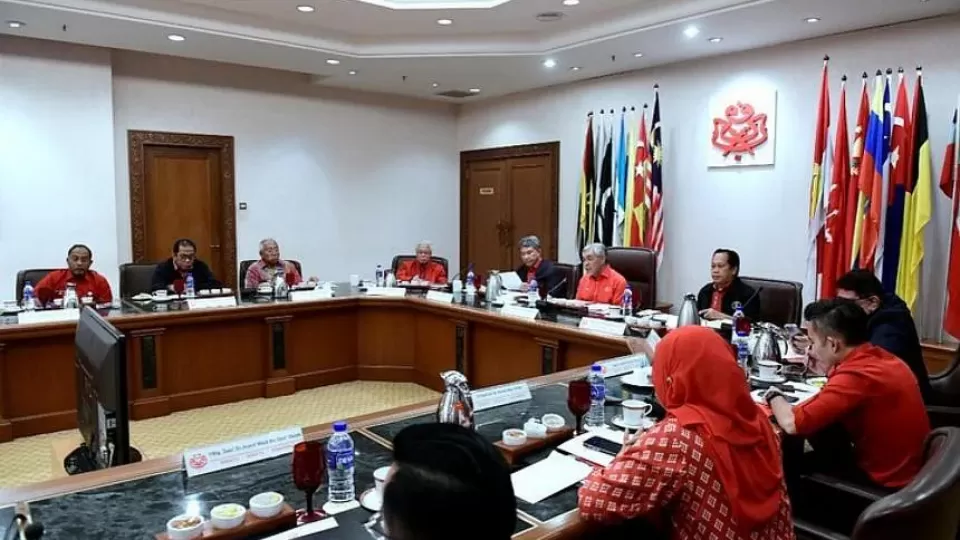October 12, 2022
KUALA LUMPUR – An electoral tie-up between two of Malaysia’s biggest Malay parties, Umno and Parti Islam SeMalaysia (PAS), is looking increasingly unlikely, potentially splitting Malay votes in the general election expected to take place in November.
The longest-ruling party Umno seems to be closing its door on cooperation with PAS despite an existing pact between them, largely due to the latter’s reluctance to sever ties with Parti Pribumi Bersatu Malaysia (Bersatu), an electoral rival and a splinter party of Umno.
Umno vice-president Khaled Nordin on Monday said that Umno is set to clash with PAS in at least 27 federal seats after the Islamist party failed to meet certain conditions for an electoral pact to materialise.
“We don’t have a relationship with PAS so there definitely will be clashes in 27 seats,” Datuk Seri Khaled said after an Umno meeting.
PAS is part of a Muafakat Nasional pact with Umno, but this is not a formalised electoral coalition.
The party is, however, a coalition member of Perikatan Nasional (PN), which it co-founded with Bersatu, led by former premier Muhyiddin Yassin.
While PN and Umno have been opponents at the state level, they were awkward allies at the national level in the Umno-led government.
The fractured relationship widened on Tuesday when caretaker Prime Minister Ismail Sabri Yaakob said he was forced to dissolve Parliament due to the actions of 12 Cabinet members from PN who had written to Malaysia’s King last week to ask for the election to be delayed.
In a statement, Datuk Seri Ismail said the actions of the ministers – from Bersatu and PAS – caused disharmony in his administration.
He also pointed out that Tan Sri Muhyiddin’s repeated criticism of his administration was a cause for disharmony.
Mr Muhyiddin had declared Umno-led Barisan Nasional as PN’s “main enemy” and previously called for Parliament to be dissolved if Mr Ismail’s administration was unable to solve the current economic slump.
PAS on Monday said it will continue with efforts to unite Umno and Bersatu so that all three Malay parties can come to an electoral understanding, despite Umno and Bersatu repeatedly ruling out working with each other.
In recent days, Umno supreme council member Puad Zakarshi and party president Zahid Hamidi have dimmed prospects of an electoral cooperation with PAS, even though talks between both parties took place as recently as late last month.
Zahid on Monday said PAS’ efforts to cooperate in order to prevent clashes between the Malay parties was a “tactical move with ploys”.
He previously said that PAS was aware of Umno’s conditions for a cooperation and that there was also a deadline for PAS to decide on its electoral partner.
Malaysia’s Parliament was dissolved on Monday, with an election now set to take place within November.
With candidate nominations expected later this month, the window for any new electoral pact is fast closing.
“The possibility of PAS working with Umno is getting slimmer by the day,” said Universiti Malaya professor Awang Azman Awang Pawi.
He said that PAS’ reluctance to decide between Umno and Bersatu also weakens the latter, as Bersatu is seen as a weak party with a half-hearted coalition partner.
Dr Awang Azman also said that Umno will emerge as the biggest winner among the three parties if the current alignment prevails.
PAS and Bersatu contested the recent Melaka and Johor state legislature elections under the PN banner in multi-corner fights against Umno.
However, PN lost both state elections with a return of only five seats in both states combined, while Umno swept two-third majorities in both state legislatures.
Dr Jeniri Amir, a senior fellow at the Malaysian Council of Professors, said that PAS’ insistence on working with Bersatu did not “make sense”.
Umno is heading to the election as favourites due to convincing wins in Melaka and Johor, as the party looks to retain federal power outright just four years after its 61-year uninterrupted rule of Malaysia was ended by a shock defeat to Pakatan Harapan (PH).
In contrast, Bersatu’s influence is seen as waning ever since party president Muhyiddin was forced to resign as prime minister just over a year ago after losing his Parliamentary majority.
Bersatu came to federal power as part of the PH coalition in 2018, but left PH in 2020, collapsing the administration and forming a new coalition government with both Umno and PAS.
But internal power play pushed Mr Muhyiddin out of office after just 17 months, forcing Bersatu to hand the reins back to Umno although Bersatu remains part of the government.
“In fact, Bersatu does not have many members, has less active party branches and needs campaign machinery to move at the grassroots level,” Dr Awang Azman said.
Dr Jeniri believes that Bersatu is likely to fare worse than it did during the 2018 elections, where it won only 13 seats but was propelled to power by its coalition partners in PH.
It then grew its number of MPs to 28 by the time Parliament was dissolved, by taking in defectors from other parties.
“They might only win half of what they won in GE14,” he said.


